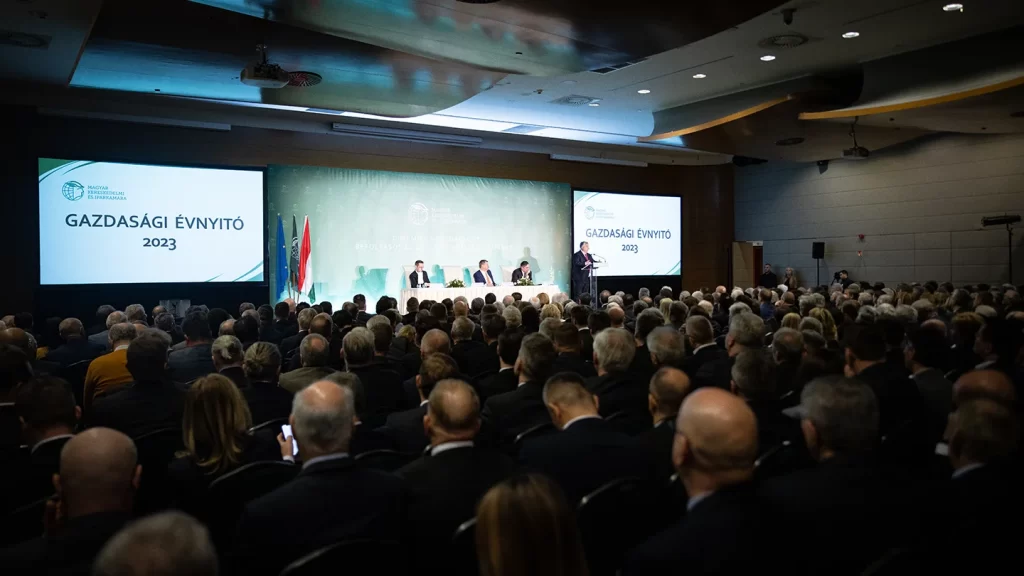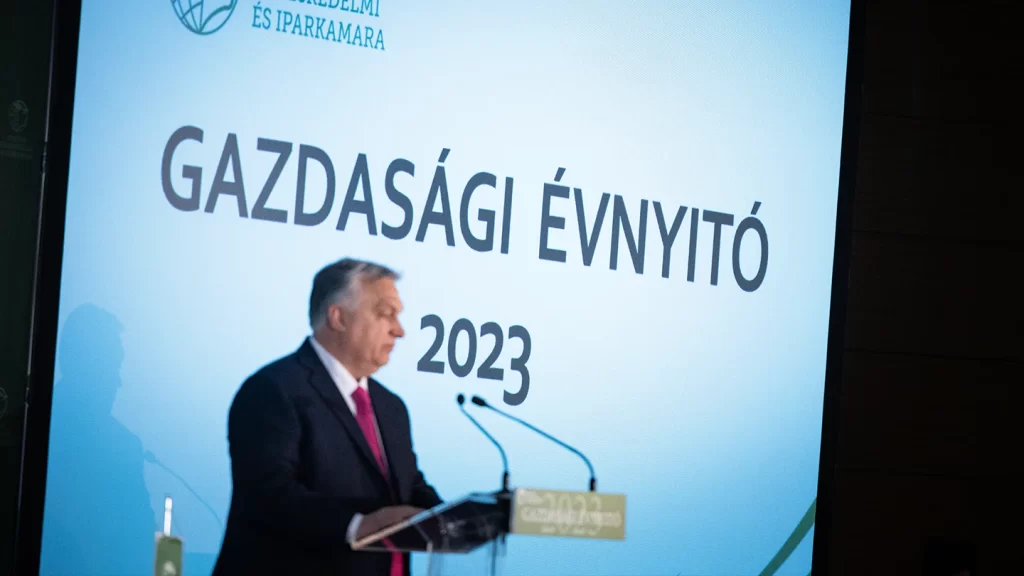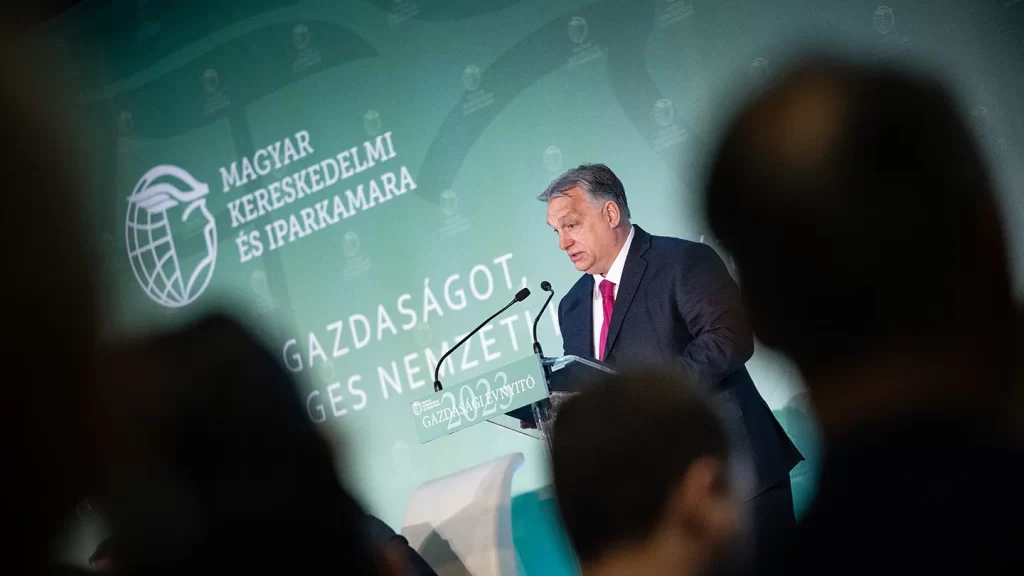Hungary will stay out of the Russo-Ukrainian war and will continue to successfully veto any sanctions that might be contrary to its interests, Prime Minister Viktor Orbán stated on Wednesday at the business year opening event of the Hungarian Chamber of Commerce and Industry in Budapest.
The government in office between 2022 and 2026 will focus on the economy, Mr Orbán pointed out, adding that while it is not customary to transform the government mid-term, very shortly after the formation of the government in May 2022, they were compelled to make changes to the structure of the cabinet. This was necessary, he stressed, because it had become obvious that the Brussels sanctions had very swiftly increased energy prices, and the issue of energy had become a key issue to the economy’s success; in fact, a key issue to the continued financing of the functioning of the country.
Under such circumstances, the need emerged for a separate energy ministry, he said, adding that the fact that Minister Csaba Lantos was not only given this ministry, but keeps it well under control is clearly reflected in a perceivable improvement in the decisions adopted by the government since.
He drew attention to the fact that, in contrast to general European trends, Hungary reduced both the sovereign debt and the deficit of the budget not only in the 2022 election year, but also in the 2018 and 2014 elections years. For this, most of the credit goes to the Finance Minister, he stressed, observing that therefore “it is foolish, it is sheer political malevolence” to claim that the government subordinated 2022 to election criteria.
The government does not wish to change its strong commitment to the market and private capital, the Prime Minister stated, adding that while at times certain forms of financing need to be induced, this is not so because the government wants to replace or to force out market financing as that is simply not possible. Mr Orbán stressed that without market financing Hungary was unable to achieve the goals set. Market financing is available if businesses have access to credit with interest that they can afford; however, today this is not available, he pointed out.
He added that the government is only intervening because market financing is not available and will only intervene until market financing is fully restored. Until then, the government will seek to raise the missing funds and to offer affordable levels of interest with the means of state intervention. However, this is a form of crisis management on the part of the government, not a change of direction, he laid down.
Similar to President of the Hungarian Chamber of Commerce and Industry László Parragh, the Prime Minister described the rebuilding of Russian-European economic relations as desirable, but does not share the President’s view that this will necessarily happen. It is now evident that the European power structure is in a process of being rescripted, and whether Russian-European relations will be rebuilt will be decided not by simple economic policy considerations, but by the extent to which this attempt at rescripting will be successful, Mr Orbán stated.
He pointed out that earlier Europe’s power structure had been based on an arrangement that Russia had provided cheap energy and raw materials, while Europe had supplied advanced, modern technologies. With the first step, the European economy has been detached from the Russian economy, and on the energy side one dependence will be replaced “slowly but surely” by another.
And if the American attempt to also “sever” the European economy from the Chinese succeeds, that will result in an economic trial even for Germany, he added.
Therefore, Hungarian foreign policy and economic policy must carefully consider what kind of a system of relations it will be able to establish and to maintain with Russia in the next 10 to 15 years, he said.
Mr Orbán explained that in the coming 1 to 2 years, Hungary would need 500,000 new workers, and in this context, the emphasis should be placed on mobilising our internal reserves.
He said workers taking part in the public works schemes are not reserves in this regard; in those schemes, people are given jobs instead of benefits, and as a result, they are able to support themselves and their families from a fair wage. We do have geographical reserves, however; it is for a reason that the most significant industrial development projects focus on Eastern Hungary. “Debrecen will be full up soon, Nyíregyháza in a year’s time, Miskolc is a more difficult case,” he listed, adding that “County Békés is preparing,” over there, there are still untapped reserves. On the other hand, if they make full use of the cooperation-based political atmosphere prevailing in the European Union that favours regional cooperation and helps communication with Hungarian communities beyond the borders, especially in the establishment of economic relations, they will be able to mobilise the work force reserves available in those regions, he stated.

Photo: Fischer Zoltán
He said “only then can we consider inviting in guest workers,” but they are unable to allow the importation of guest workers just because according to some employers they represent work force of higher quality than the reserves available in Hungary. “Hungary belongs to the Hungarian people, jobs, too, primarily belong to the Hungarian people,” and the Hungarian economy must provide jobs primarily for Hungarians, “everyone else can only come after them,” he laid down.
He said we must avoid the Western European trap that guest workers are invited in because the locals are no longer prepared to do jobs of certain types.
He stressed that “we can’t afford the luxury of bringing in foreign work force purely for reasons of convenience; foreign workers, God only knows how many of whom will decide to stay here.” If a job is inconvenient, hard, then employers must pay more for it, but “we can’t give foreigners an advantage over Hungarians,” he stated.
He observed that guest workers were only allowed to stay here for a fixed term, and if necessary, their employment could be terminated.
The government will keep the level of taxation low, the Prime Minister said, quoting OTP Chairman-Chief Executive Sándor Csányi who once said that rather than levying new taxes, those already levied must be collected. He observed that this goal had only been partially achieved as the bank levy had been imposed; but on the whole, this is the right direction.
Regarding the global minimum tax, Mr Orbán promised that all its excess burdens would “lie with foreigners, not with Hungarians.” He said Hungary “has a piece of paper” from the European Union that the local trade tax can be offset against the minimum tax. This protects large Hungarian companies almost without exception, and so for them the introduction of the global minimum tax will not represent an excess tax burden, he explained.
In the context of higher education, he said connecting universities to the actual functioning of the economy continues to remain key; it does not matter what “nasty tricks” the European Union may be trying on, for instance, with the Erasmus or Horizon programme.
The EU is taking a competitive advantage away not from the government, but from Hungarian universities. This competitive advantage stems from the fact that universities operated in the newly reorganised regime are directly connected to governmental decision-making through state secretaries and ministers, he pointed out.
“This is important not for the government or the persons sitting on the boards, but for universities. Such a direct connection is the biggest possible competitive advantage that we had over our western competitors,” the Prime Minister stressed, adding that this is a decision against the competitiveness of the Hungarian economy and Hungarian universities which we must not resign ourselves to.
He indicated that while we had been compelled to change the composition of the boards of trustees, we must not surrender the advantage that Hungarian universities constitute an integral part of the development of the economy.
He said while he believes that they will be able to come to an agreement with the EU, even if they fail, they will finance these educational programmes from the Hungarian budget in a worst-case scenario. He added that if the EU refuses to provide these funds for our universities, they will receive research funds in excess of the EU level from the Hungarian budget so that they can build their own systems of international research relations.
The policy of the next two years to be overseen by Energy Minister Csaba Lantos will focus on the establishment of further energy capacities, he said. Mr Orbán highlighted that Hungary had an industry policy which focused on investments and projects in the industry, and these were energy-intensive.
We will build gas-fired power plants in order to serve large industrial centres, the Prime Minister pointed out, adding that the relevant decisions have already been adopted. These are not prohibited by the EU as in the situation that has developed, gas does not qualify as “an enemy.”

Photo: Fischer Zoltán
Energy can be imported or generated, and Hungary is unable to generate energy from any other source than from gas. Among alternative sources of energy, we have solar energy, perhaps, we will also have some wind power, and we likewise have some geothermal energy, all of which we could perhaps elevate to the level of supplying a quantity of energy that is also meaningful for the national economy, but we are not there yet, the Prime Minister pointed out.
Mr Orbán highlighted that during the period ahead, we will have to exploit the possibility that we are able to build gas-fuelled power plants relatively swiftly. Whether these will be built by the state or with the involvement of private capital will be decided later, but we will have to build two or three high-performance power plants which will be able to supply industrial developments with energy.
If the EU provides funds for these projects – as they should – Hungary will use those EU funds; if they do not, we will use funds raised from other sources as investors the world over are always happy to finance projects of this nature, he explained.
The Prime Minister described the interest payments on the existing sovereign debt service as another problem. He said after 2010, thanks to the strategy of György Matolcsy serving as Minister of the Economy at the time, the Hungarian economy had access to funds with lower interest rates. Now, however, the situation is the exact opposite of that because due to high inflation throughout Europe, interest rates are high everywhere. Therefore, we must renew the earlier lower-cost debts with debts with higher interest rates.
Mr Orbán added that for the time being, there was no direct threat because the loans taken out earlier which would mature shortly would only represent a small percentage of the total debt in 2023 and 2024; they could pose a more significant interest burden later, by which point – it is to be hoped – interest rates will normalise.
The Prime Minister also mentioned that in the past few years, there had been no major dilemmas regarding economic policy; the Hungarian economy developed effectively without any debates about the possible directions of economic policy. This clearly shows how stable Hungary’s economic policy was, he added.
He said there is a new situation now, “there is now a debate on the issue of economic policy, for instance, between the central bank and the government.” However, this is not abnormal; it is only unexpected compared with the fact that in the past 7 to 8 years there had been no such debates, he argued.
He took the view that in the past four years, certain elements of the economy had suddenly changed, and at times like this, debates always emerged. However, “rather than fearing such debates, we must properly process them intellectually, keep them within boundaries.”
He said according to the central bank’s concept, inflation should be managed by significantly reducing the quantity of money present in the economy. If, however, inflation is fundamentally a consequence of a rise in international energy prices and a policy of sanctions, we should not necessarily reduce the quantity of money available to the economy in such quantities and at such a pace, he said.

Photo: Fischer Zoltán
He stressed that the level of coordination in Hungary’s economic policy that had been an important element of our successes to date would also be maintained during the period ahead.
The Prime Minister highlighted that if the government’s policy against inflation proves to be successful – and the first signs of this are already reflected in the February figures – and inflation starts decreasing in the coming months because the government’s measures start yielding tangible results, it will be easier to coordinate the central bank methods devised for the management of inflation with the methods of the government.
He said we must accept that debates on economic policy can serve as a possible stage for “otherwise intellectually capable, colourful personalities to perform and to shine.” “I myself am no exception,” he said, adding that “this is typical of us all as we are humans and move about in the realm of politics.”
Regarding the automotive industry and battery plants, Mr Orbán highlighted that every Hungarian citizen had the right to live their lives in a liveable environment, and everyone had the right to ensure that all projects could only be implemented in Hungary in compliance with the most stringent possible environmental regulations. Hungary continues to apply the most stringent safety regulations in the case of all industrial projects; these are more stringent than in comparable German factories, he stated.
He observed that in Hungary approximately 300,000 families were earning a living in plants attached to the automotive industry.
He said in this area, a change of technology is taking place; if after 2035 only electric vehicles are allowed to be manufactured in Europe and the vehicle components necessary for electric vehicles are not manufactured in Hungary, they will be manufactured somewhere else, and our conventional automotive plants will slowly close down.
He highlighted that we must keep the Hungarian automotive industry in Hungary, and must create the necessary manufacturing technologies and factories in Hungary.
The Prime Minister stressed that at present, the four largest projects in the history of the Hungarian economy are taking place all at once, including two in the eastern part of the country. These are fantastic industrial developments on a historical scale which will, within a few years, start yielding tangible results in East Hungary’s major big cities, he said.
Hungary will stay out of the Russo-Ukrainian war and will continue to successfully veto any sanctions that might be contrary to our interests, the Prime Minister stated.
“There will be a lot of pressure, we will be under a lot of pressure, but we are strong enough – as we are not a coalition government – to stay out of the war,” Mr Orbán said.
The Prime Minister promised to maintain the Russian supply of energy, to continue to finance the reduced household energy prices, and to protect and even increase the current 4.7 million jobs. He added that they would be able to support small and medium-sized businesses with special programmes even if the central bank prime rate remained high, while they would likewise continue to promote investments and would build the necessary energy capacities.
He also said the government will maintain Hungary’s export-oriented growth, whilst reducing inflation.
There is “steam” in the Hungarian economy, there is entrepreneurial spirit in Hungary, Mr Orbán said, announcing that on Wednesday the government was required to decide on raising Eximbank’s capital by HUF 30 billion in order to enable the ministry of the economy led by Márton Nagy to “push” another HUF 300 billion into the economy in the interest of the realisation of economic development goals.
He stressed that there were production capacity increases in Hungary which demonstrated that the foundations were robust.
He said in 2022 the Hungarian automotive industry broke through the ceiling of HUF 10,000 billion for the first time, reaching HUF 12,000 billion, while the electronics sector, too, exceeded HUF 10,000 billion for the first time. For the first time last year, the food industry surpassed a production value of HUF 6,000 billion, the metal industry reached HUF 4,000 billion, while the pharmaceutical industry set a record at one thousand billion forints, he listed.
In the context of investments, he further highlighted that, compared with its competitors, Hungary acquired investments with the lowest grant intensity at 18 per cent. With one forint’s worth of investment grants, we achieved a HUF 22 extra sales revenue and a HUF 5 extra added value, while one forint’s worth of investment grants generated HUF 2.5 tax revenues, he listed. He also drew attention to the fact that in the case of Hungarian businesses, the intensity of grants is one and a half times higher – 24.4 per cent – than in the case of foreign businesses (17 per cent).
He observed that “only left-wingers who have never seen an actual economy believe that capital is out there, wandering the streets, eagerly awaiting to plonk itself down somewhere.” By contrast, in reality, capital carefully does its sums, and makes countries and sites compete for its presence.
He also said based on its population, Hungary is ranked 94th in the world; at the same time, in the world rankings of exports we are in 34th place, and with this, we are the world’s 15th most open economy.
He thanked the Chamber for its cooperation, pointing out that in the past few difficult years, they have always been able to count on the actors of the economy. Regarding the future, he quoted from the play ‘Bánk Bán’: “you must not fear, it will be good.”